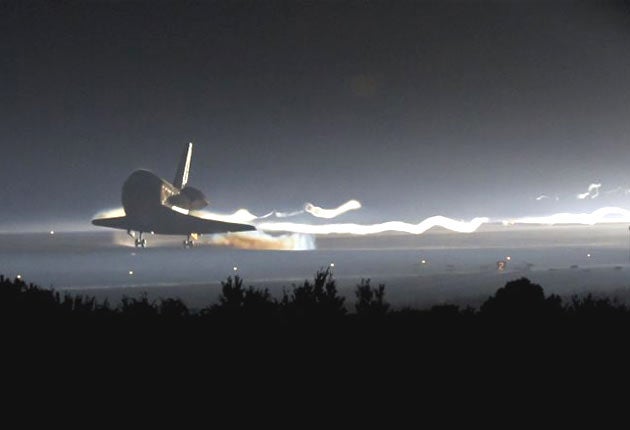'Mission complete, Houston'; from spacecraft to museum piece, the shuttle adventure ends

The space shuttle Atlantis returned to Earth yesterday, bringing down the curtain on three decades of space exploration.
The 135th and last Nasa shuttle mission ended at 5.57am, with a touch-down at the Kennedy Space Centre in Cape Canaveral, Florida, following a 13-day, 5.2 million-mile mission to deliver supplies to the International Space Station (ISS). Watched by 2,000 onlookers, Atlantis generated two sonic booms as she glided through the sky.
"After serving the world for over 30 years, the space shuttle has earned its place in history. And now it has come to a final stop," Christopher Ferguson, the commander of the four-person crew, declared from the cockpit, adding: "Mission complete, Houston."
Although the spectacle was relatively understated in comparison with the extravagant final take-off earlier this month, it was nonetheless imbued with a palpable sense of both history and not a little nostalgia.
Along with every other surviving space shuttle, Atlantis will now be transported to a museum, the victim of Nasa budget cuts. Its retirement will leave America without any means of launching its own astronauts into orbit and ends half a century of Nasa dominance in space exploration.
After the groundbreaking first launch of Challenger in 1981, space shuttles were responsible for building the ISS and launching the Hubble Telescope. They flew 542 million miles, circling the Earth 21,150 times and carrying 355 people from 16 countries.
Over the years, the programme bounced back from the disasters that saw Challenger and Columbia destroyed, in 1986 and 2003 respectively. But it never really lived up to its creators' vision of providing an inexpensive means to explore space.
In recent years, each launch cost around $450m (£276m). With Nasa facing annual budget cuts of $1.9bn and the White House eager to focus on explorations of deeper space, a decision was taken seven years ago to close the programme.
Last-ditch appeals from figures such as Apollo 11 legend Neil Armstrong failed to prompt a change of heart and roughly 9,000 jobs in and around Cape Canaveral are now likely to be lost.
Under a new Nasa remit, approved by President Barack Obama last year, the Agency will aim to put a spacecraft on an asteroid by 2025. A manned trip to Mars is scheduled for the mid-2030s.
Join our commenting forum
Join thought-provoking conversations, follow other Independent readers and see their replies
Comments
Bookmark popover
Removed from bookmarks